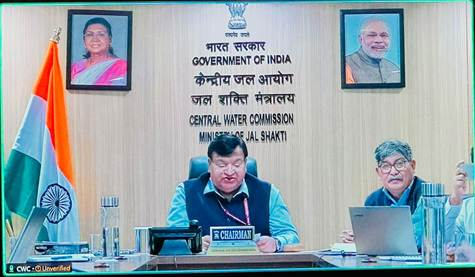Sujalam Bharat Summit Highlights Tech Solutions for Efficient Water Management
Shri Paithankar, in his thematic presentation, underscored water demand management as a key strategy to reduce stress on India’s limited freshwater resources.

- Country:
- India
In alignment with the vision of Prime Minister Shri Narendra Modi to integrate grassroots perspectives into policymaking, the Ministry of Jal Shakti (MoJS), in coordination with NITI Aayog, has initiated a series of six Departmental Summits. Among these, the “Sujalam Bharat” Summit is dedicated to water management—an issue central to India’s sustainability and future growth.
As part of the Summit, the Central Water Commission (CWC), Department of Water Resources, River Development & Ganga Rejuvenation (DoWR, RD & GR), organized a virtual workshop on the theme “Technology for Efficient Water Management”. The event brought together policymakers, grassroots workers, gram panchayat representatives, Water User Associations, and experts from across India, spanning from Leh to Tamil Nadu and Arunachal Pradesh to Odisha. The National Remote Sensing Centre (NRSC), Hyderabad, also showcased its technological contributions.
Opening Perspectives
The workshop was chaired by Shri Atul Jain, Chairman, CWC, with key addresses from Shri Yogesh Paithankar, Member (WP&P), CWC, and Smt. Archana Verma, Additional Secretary & Mission Director, National Water Mission (NWM).
In her opening remarks, Smt. Verma emphasized that the six sectoral thematic conferences are being convened under the direct guidance of the Hon’ble Prime Minister to ensure that grassroots inputs shape national and state-level policies. She noted that community voices, alongside expert insights, are vital for scaling up technologies in efficient water management.
Strategies for Efficient Water Management
Shri Paithankar, in his thematic presentation, underscored water demand management as a key strategy to reduce stress on India’s limited freshwater resources. He laid out a roadmap centered on three major pillars:
-
Agricultural Efficiency
-
Expanding micro-irrigation systems in both canal-irrigated and groundwater-dependent areas.
-
Promoting precision agriculture for better climate resilience.
-
Encouraging crop diversification toward drought-resistant and low-water-use crops.
-
-
Modernization and Automation
-
Upgrading tertiary canal systems for improved distribution.
-
Leveraging remote sensing, AI, and digital technologies for water resource planning, conveyance efficiency, leak detection, and real-time monitoring.
-
Integrating digital platforms to optimize water supply for agricultural, industrial, and domestic use.
-
-
Water Conservation and Accounting
-
Promoting water-efficient appliances in households and industries.
-
Implementing water accounting systems to support informed allocation.
-
Prioritizing soil moisture conservation (green water) in agriculture to reduce reliance on external water inputs.
-
Presentations from States and Institutions
The workshop included detailed presentations from states such as Karnataka, Madhya Pradesh, Odisha, Maharashtra, Rajasthan, and Haryana, alongside NRSC Hyderabad. These presentations highlighted:
-
Community-driven models led by panchayats and local water user groups.
-
Successful deployment of efficient irrigation technologies in water-scarce districts.
-
Innovative data-driven approaches for water distribution and conservation.
-
Grassroots innovation in rural areas, from Odisha’s decentralized water solutions to Rajasthan’s traditional conservation practices.
These case studies reflected India’s diversity in approaches, blending traditional wisdom with modern technology to achieve scalable solutions.
Concluding Insights
In his closing remarks, Shri Atul Jain, Chairman, CWC, stressed that water management is not merely about infrastructure or technology adoption but about building a holistic, sustainable framework. He noted that the Technology for Efficient Water Management initiative is designed to secure India’s water future, ensuring that policies are both science-driven and community-informed.
Building a Water-Secure India
The Sujalam Bharat Summit, through this workshop, reinforced India’s commitment to sustainable water use, climate resilience, and grassroots empowerment. By bringing together multiple stakeholders, from local panchayats to national institutions, the initiative embodies the government’s “whole-of-nation approach.”
It also reflects India’s resolve to integrate innovation, inclusivity, and efficiency into water management, a crucial step toward achieving the national vision of a water-secure and prosperous Viksit Bharat by 2047.










